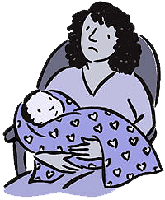If you are easy to communicate and are not prone to competition - then you have less likely to get sick. And if not? Define to which psychological type you feel and act!
Content
This mysterious “a type D”.
 Imagine two patients who have undergone equally dangerous heart attack. One of them – Cheerful, open and optimistic person who tries to recover from all his might. Second – closed, sad, grumbling all the time and does not want to listen about recovery. One of them cured. What do you think that?
Imagine two patients who have undergone equally dangerous heart attack. One of them – Cheerful, open and optimistic person who tries to recover from all his might. Second – closed, sad, grumbling all the time and does not want to listen about recovery. One of them cured. What do you think that?
It is easy to guess that a merrycloth probably has an advantage over grumbling. Doctors have long suggested that the type of character is associated with the degree of risk for health. One of these doctors, John Denollet, working as a psychologist in separating the rehabilitation of patients with diseases of the coronary system, noted that patients with absolutely identical states react differently to therapy. "When I worked with these patients, I got the impression that two main character traits play an important role. But to make more serious conclusions, you need empirical data".
Denollet, Professor of Medical Psychology from Tilburg University in Holland, has already conducted a study with the participation of patients of heart offices, as well as patients suffering from hypertension, heart failure, arrhythmia, arterial diseases. Research results prove that his intuition did not fail. With this study, he managed to allocate the type D patient – those who are inclined to form chronic stress dangerous to health. This suggests that the state of the psyche has the same key importance to the health of the heart, as a diet, exercise and external stress.
Caution: Negative excitability and social suppression
Two main characteristics of this type of person, highlighted by dennalet, – it is first, "Negative excitability", Next to experience negative emotions: anxiety, sadness, pessimism; And, secondly, "Social suppression" – tendency to restrain the expression of emotions, a tendency to low self-esteem and secrecy. However, he emphasizes that its classification – This is not just a distinction between a merry and grumbling.
"It is exactly the combination of negative excitability and social suppression. A person can be very negative by excitable, but if he says that he feels, he can cope with it and the risk does not increase for him", – He says.
To establish belonging to Type D, Professor Denollet developed a questionnaire from 14 questions, known as DS14, which turned out to be an effective tool for forecasts in cases of cardiovascular diseases.
"If a patient with a cardiovascular disease belongs to type D, the risk of heart attack or premature death for it increases four times", – says Denollet.
The relationship of psychological type and diseases.
The selection of the type of personality D is the continuation of the well-known work of psychologists of the 1960-70s, which related specific personal characteristics with health. Ambitious, purposeful workaholics were attributed to type A. They are more inclined to experience stress and the risk of increased pressure and heart disease increases for them. Type B people who are not inclined to competition, light in communication and thoughtful, are not exposed to special health risk. Type C – Reliable people who can overcome the difficulties that avoid conflict situations by suppressing their feelings. For them, based on research, increased risk of cancer.
"Paradoxically, patients type D realize what happens to them – that they quickly get tired or what they suffocate, but they do not turn to the cardiologist to cope with these problems. If a cardiologist knows that his patient belongs to this type, he can appoint more meetings with such a patient and spend more analyzes to be aware of what happens to him", – says Denollet about the values of his discovery.
And if I treat “Type D”?
Does this mean that you should be disturbed if you feel about D? Not necessary. "There are quite healthy representatives of this type that can freely talk about what happens to them in life. Smoking is also associated with the risk of heart disease, but if you smoke, you do not need a heart attack. But if you feel about the type D and at the same time suffer from chronic diseases, you should change something in your life to become happier".
These changes can be achieved using psychotherapy, antidepressants or lifestyle changes that will reduce the alarming thoughts.
Meanwhile, the Texas Institute of Heart Diseases made a statement that "There was evidence that the type D changed type A in terms of the greatest risk factor for cardiovascular diseases".
Posted by: Penny Wark









